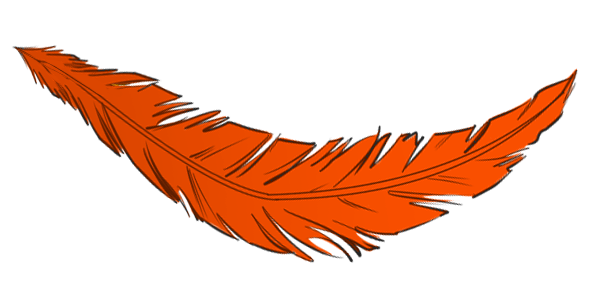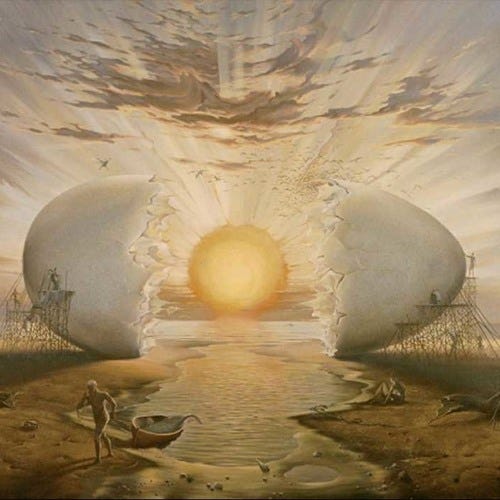The abyss opens up beneath me. I'm scared. The abyss opens up beneath me. Therefore, I'm scared.
No, that wasn’t it. That wasn’t it last time this happened at least. Several weeks ago. True story.
The abyss opens up beneath me. I'm scared. I'm scared. Therefore, the abyss opens up beneath me.
There you go.
So the real question was and is, why afraid?
If I have anything useful to report here — for the benefit of both the dedicated and the curious — it is that answers will come. Through appropriately directed meditation, through introspective waiting, through “allowing,” until sooner or later, or at last: insight.
What is the source of fear? There’re personal answers, to be sure, in my case. But to generalize: Change.
Destructive change to put a qualification on it; but all profound change, sea change, star core change, is destructive of what was. It’s fine to imagine our cells gradually dispersed in oceanic surge, or our spirits dissolving into air or curling up to the heavens, once again at one with the universe — but who wants to be consumed for others’ predatory nourishment or as fuel for the elemental forge? We want creation, but we want it for ourselves as we are now. A paradox.
Creation, growth; from out of the fire, yes, but also for betterment, success: such is change, transformation — meanwhile, how comfortable we get in our given conditions! What if what comes makes us unrecognizable to ourselves?
That sense of an ending. Now. Why now? Dread for a long time, through the Trump years, through the pandemic; the continued threat of the election (Historical Junctures). For a good six weeks, less panic and dread, more hope: yet, the real fight is about to begin. Similar to the feel of cooler weather here in the DC metro area, autumn hints in the midst of August endings. Good change in the air can still feel like trepidation.
We don’t know what’s going to happen.
End Times’ drastic, biblical overtones front vatic openings: from politics to the cataclysmic, as if the earth could crack. Armageddon Time, a movie I saw on a plane recently — a lesser Fabelmans, but with a fantastic menschy performance by Anthony Hopkins (the title benefits from its connection to the Clash song, different spelling1) — intimates cultural and political times’ infiltrations on coming-of-age: the closing of a personal or generational or societal era without promise of closure.
At such endings, estrangement begins. Usually. Or, every once in a while, an opportune breeze promises safe harbor.
Maybe it’s a fault in me as an artist, the felt need for a living basis of openness and freedom of thought in order to work; of course, good art — or smart, subversive thinking and practices — can come duly out of oppression. The Killing Joke is/was an attempt to swallow the monster whole, laugh-crying as I choke it down; also, from a similar headspace (and in support of that book), I started this Poetry, Thought, Word Magick Substack as “Works and Workings in Joy and Despair for Love of the World.”2 Along the way, I’ve come back to myself, my early self, in aspiration and dedication: the path is Mastery, and nothing external should matter. Inner and outer conflict: I strive too for the external — I fight too for the external. The unexpected, the unknown, the open - what circumstances (and their societal foundations) allow for such? Then again, no matter: whatever gets in the way is an excuse, merely an excuse.
On the small, personal scale, this Tuesday-Wednesday my wife and I dropped off our son Gryphon at college for his first year, his sister Hero along for the ride (an inversion of her college drop off six years ago), so now we are empty nesters or, as Manya likes to say, free flyers. A new phase for us, for him.
What’s to lament? He’s ready and in the right place for him. Already, there’s a lightness to the absence, and if I miss his distinct presence(s), it’s because I perceive them as layers of time peeling from the paths he traveled through the house his entire growing up, ethereal time-lapse transparencies. I can’t enter a room and check in on him right now. But, I can hear his cadenced, buoyant “Hi!” from whenever he walked through the front door, resonant off the walls for all corners. Plus, my muscle memory gets its exercise in the eighteen-year stretch from having to lean down to put my hand on the back of his head to having to reach up to get an arm around his shoulder.
Only a moment to leap out of time.
A timeless work or moment partakes of the eternal; a prized release from the series of ticking instants making up that chronological time which stretches us into past and future - which racks us with cause and effect, keeps us stuck on its track or longing for what’s to come or what was lost, or for what can be done to justify our sense of ourselves, what we were or hope to be. What we are is fugitive to measurable time.
Another part of the poem I quoted from Yehuda Amichai in As The Stone Opens: “The years of my life I have broken into hours, and the hours into minutes/ and seconds and fractions of seconds. These, only these,/ are the stars above me/ that cannot be numbered.”
That abovemention release - relief - is prized, as in “cherished,” “precious,” “blessed,” but also you have to pry it from the stiff morbid grip of temporality.
I recur to that sense of needing (personal and societal) freedom for art, but perhaps a better creative orientation is to flip it and know that art singularly frees.
I want and think I need peace and a quiet to write, to allow the poetic to arise within, or simply to hear the trickling of the Enchanted Spring, the echo of Echo’s singing fragments of flesh. Not to be confused with quietism; I will fight for this kind of peace. The title3 of Wole Soyinka’s memoir — You Must Set Forth at Dawn — is from an earlier poem of his, when in youth he still felt the “holy hour” of the sun’s suffusion of the land as an aspect of his nation’s humanism; under dictatorship, nothing humane was left to the very materiality of the country and its culture, only death without dignity on the road, “I was fated to watch the nation turn both carrion and scavenger as it killed and consumed its kind.”
Brutal times deny the possibility of a holy hour. To love is to safeguard: our loves, our work, our being in the world, past, present, and future. (So then our aging and life stages each retain their sacred characteristic glow.) In pride or in shame, displayed or secret, the past leaves its traces on us. We despair without a hopeful sense of the future, but it’s best to conceive of the future not as future (which isn’t real for us now), but of the future in the present, vindication of the present. What is timeless of the moment, what takes us beyond the moment, what is in the work now that ensures its future if there is a future (and if there’s no future, what that quality is now), is active now, justifying the now now: thus, there’s no need to cherish the phantasm of some future justification to be applied retrospectively, retroactively!
Insert lapidary ultimage insight here.
Recommended reading (for archetypal wisdom, although its prose is rather diffuse): Why The World Doesn’t End: Tales of Renewal in Times of Loss by Michael Meade.
The painting above, “Sunrise by the Ocean” (Vladimir Kush), is cover art for the book.
The following paragraph indicates where I was last fall, a year before the election (to the month). I couldn’t bring myself to include it in a post until now.
The world is in disarray. The heart breaks with every hearkening to what’s going on far and near. The artist tries to rise above politics and turmoil in vain. The monk, the spiritual-seeker, the hermit philosophizer are wise only for their cave walls. Any true enlightenment teaches one that to mind one’s own business is indeed to confront the wider world. What happens across the globe, as in my own backyard, is my business - I’m implicated, because everything is connected. Everyone knows that, to the bones. You can’t evade taking a side, for you’ll be pushed across a line at last. But the label or meaning of each side isn’t pindownable once and forever. No excuse in complexity, but there are sides, and truth(s). We’re entering a perilous, lurching, democracy-tottering election year, a dysfunctional congress brings us to the brink of government shutdown over and again, and we have no enforceable recourse for a corrupt supreme court; meanwhile, war is abroad, with a nation fighting for its life in Ukraine, and the Israeli-Palestinian conflict a belching hell of irreconciliables. All shitshow. All omnishambles. Yet, there remains a way forward; by the very fact that so much is in play, so much is at stake. Right now and glaring, though, it’s all a killing joke and Trump the clown figure continues as ever to tumble through every news cycle like a giant parade balloon in bulbous slow motion…
End Times end the world as we know it, be it equilibrium or chaos. Yet, repeated throughout history, somehow at last — an emergence of the eternal — justice catches up, goodness finds its spine and takes a stand: Timeless renewal, Timeless resurgence, forces gather to meet the moment.
“Armagideon Time” was the B-side to the “London Calling” single (1979), but not on the London Calling album. I didn’t realize until now it was a cover of Jamaican reggae artist Willi William’s original hit (recorded in ‘77, released in ‘79). The inclusion of “gideon” in the spelling intrigues me for associations it brings up as a name: the prophet, the motel room bible, Bob Fosse’s semi-autobiographical director-choreographer character, Joe Gideon, played by Roy Scheider in All That Jazz of the exact same era as the song.
It won’t hurt to play either version as background music to this post.
The Killing Joke, my poetry hybrid (still forthcoming, still forthcoming), implies the necessity of an open society for sustaining a breathable cultural atmosphere, with its notice of how many figures died at the looming and onset of the Trump era, as if they sensed that their moment was decisively passing: David Bowie, Prince, Leonard Cohen (the day before election day 2016), Tom Petty, Sam Shepard, more…
Less grim (sort of), the section in the book on "Death by Laughter in Real Life.” This Substack presented a teaser here: Top Ten Real People Who Died Laughing
A title as rousing as the dawn. The best titles have magnetic pull. I know nothing about Soyinka’s play, Requiem for a Futurologist, but I must get hold of it — no luck so far.






We really enjoyed reading this, M! ❤️❤️